Surah Al Waqiah
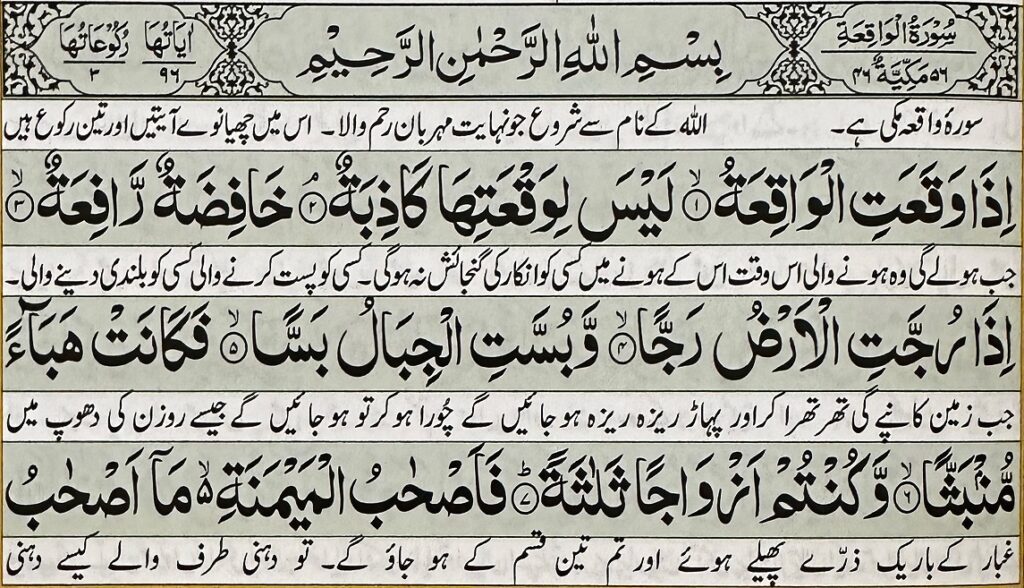
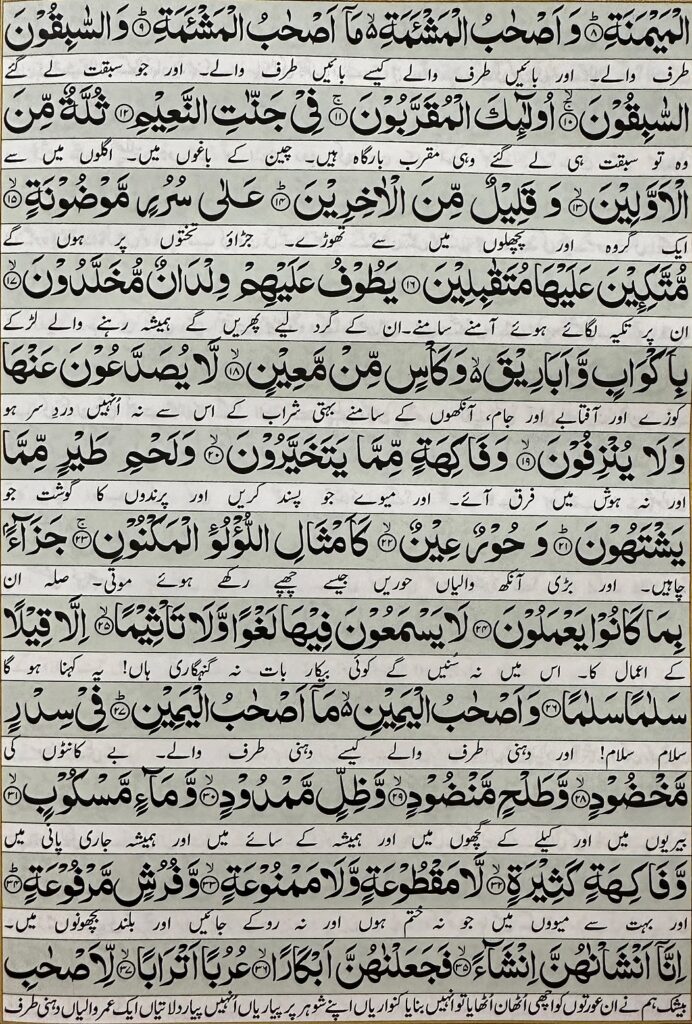
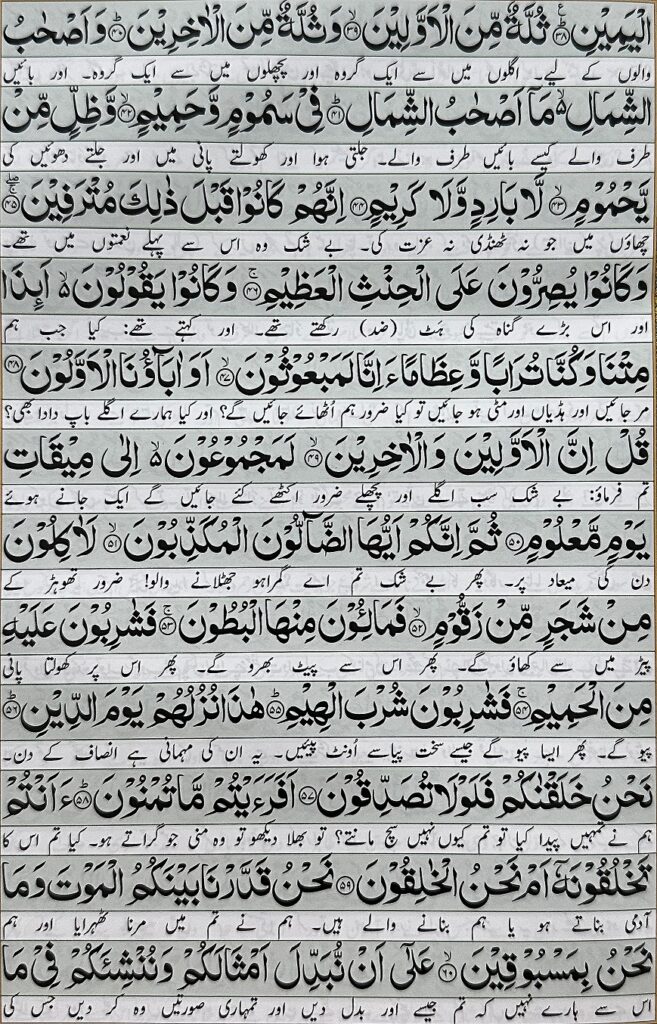
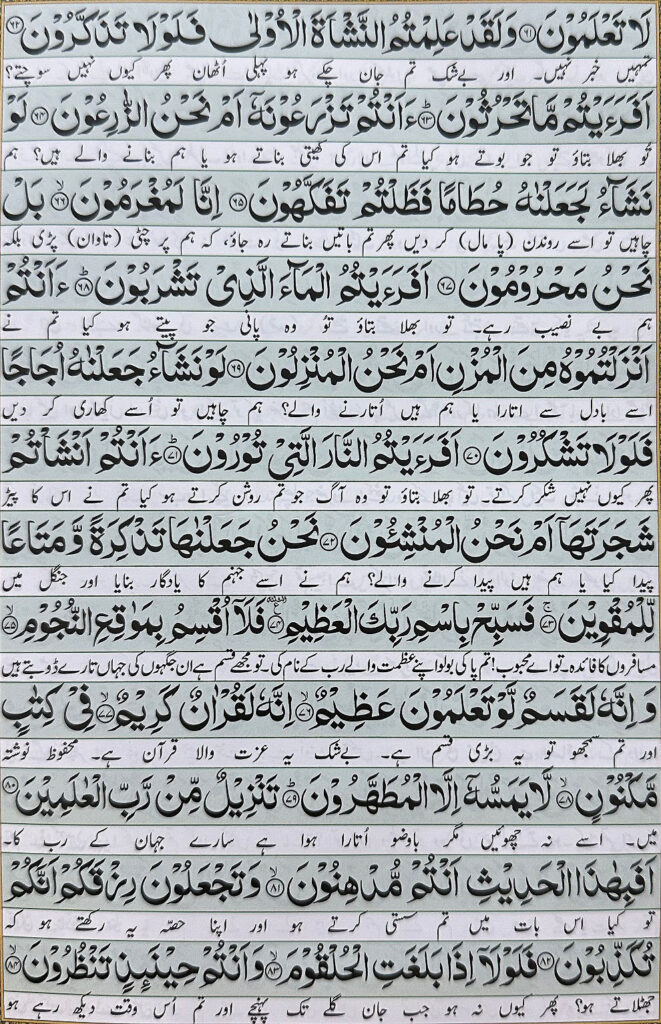
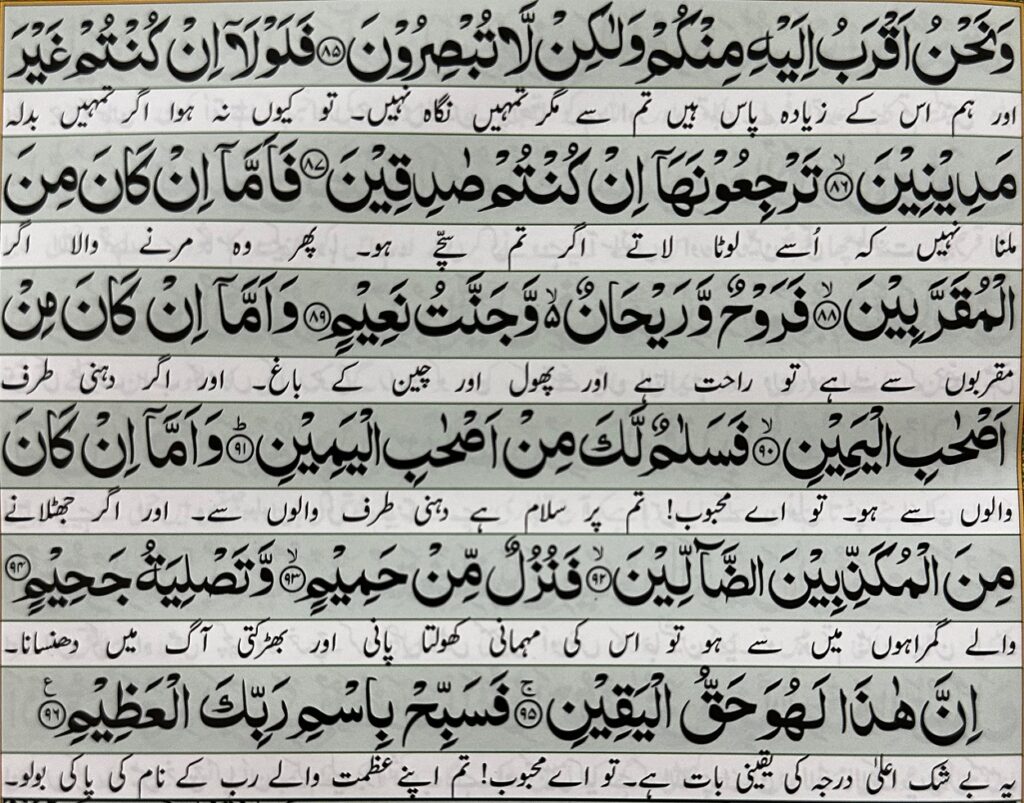
Surah Al-Waqiah (سورة الواقعة) is the 56th chapter of the Holy Quran, and one of the most well-known surahs recited by Muslims across the world. Revealed in Mecca, this chapter has 96 verses and is named after the opening phrase “Idha waqa’ati al-waqi’ah” (إِذَا وَقَعَتِ الْوَاقِعَةُ), meaning “When the Event occurs.”
The word al-waqi’ah means “the great inevitable event,” pointing directly to the Day of Judgment. While many events in life are uncertain, the Quran describes this one as definite. It signals the end of our worldly life and the start of eternal accountability.
Surah Al-Waqi’ah is central to Islamic faith because it talks about resurrection, judgment, heaven, and hell, reminding us of Allah’s power in creation. Beyond its religious meaning, many also know it as “the Surah of Wealth” becausetraditions connect it to protection from poverty.
The real beauty of Surah Al-Waqi’ah, though, is how it balances hope and fear. One minute, it’s celebrating the joys of Jannah, and the next, it’s bringing us back down to Earth with stark reminders of what’s at stake. It’s like it gently prods you to look inward and ask, ‘Am I where I want to be spiritually?’ Honestly, that’s probably why people say it softens the heart.
What we will be discussing in this article:
- Revelation and background of Surah Al-Waqi’ah
- Its core themes and significance.
- Relationship with other chapters in the Quran
- Hadiths related to its virtues and righteousness
- Life lessons
- Practical advice for recitation
- Tips and FAQs about recitation and meaning
- The Revelation and Title of Surah Al-Waqi’ah
Surah Al-Waqi’ah was revealed during the Meccan period, a time when the early Muslim community faced persecution and hardship. The surah’s focus on the afterlife offered consolation to believers while warning disbelievers of the severe consequences of rejecting faith.
It was named Al-Waqi‘ah because it begins with the powerful verse:
“When the Event (al-Waqi’ah) occurs there is, at its occurrence, no denial.” (Qur’an 56:1–2)
This name is also used for the Day of Judgment, highlighting how certain and significant it is.
The ‘ulama’ state that the Prophet ﷺused to recite this surah frequently, and Ibn ‘Ashur states that “It was already known among the Companions by this name, and no other name was ever used for it.”
Connection with Other Surahs
There is a deep connection between Surah Al-Waqi’ah and Surah Ar-Rahman, as explained by classical scholars. Both chapters deal with resurrection, paradise, and hellfire:
1. In Surah Ar-Rahman, Allah describes the delights of Paradise and the punishments of Hell.
2. Surah Al-Waqi’ah expands on these descriptions but divides people into three groups:
Asḥab al-Maymanah (People of the Right): destined for Paradise.
Asḥab al-Mash’amah (People of the Left): destined for Hellfire.
As-Sabiqun (The Foremost): the elite among the believers who are closest to Allah.
Thus, Surah Ar-Rahman emphasizes divine mercy, while Surah Al-Waqi‘ah emphasizes divine power and accountability.
Another interesting link is with Surah Hud. The Prophet ﷺonce said:
“Hud, Al-Waqi‘ah, Al-Mursalat, ‘Amma Yatasa’alun, and Idha ash-Shamsu Kuwwirat have made me old.”
These chapters place a heavy emphasis on the Day of Resurrection to the extent that they deeply impacted the Prophet ﷺ, who bore the weight of warning his people.
Main Themes of Surah Al-Waqi’ah
The surah contains powerful themes that remain relevant to every generation:
1. The Inevitability of the Day of Judgment
The opening verses establish the certainty of the Resurrection. Unlike myths or speculations, the Qur’an stresses that the Hour will definitely occur.
2. Division of Humanity into Three Groups
Surah Al-Waqi’ah uniquely divides people into three categories, not just two:
- The elite believers (as-sabiqun), those who were first and foremost in doing good deeds, will attain the highest ranks in Paradise, closer to Allah.
- The righteous believers (asḥab al-yamin), often called the People of the Right, are those whose good deeds outweigh their bad. They will be welcomed into Paradise, though not at the level of the elite.
- The disbelievers (asḥab al-shimal), or People of the Left, are those who reject faith and persist in wrongdoing. They face punishment in the Hereafter.
This three-fold categorization emphasizes that not all who believe are equal, righteousness and sincerity receive reward in the afterlife.
3. Attributes of Allah’s Power in Creation
- The surah refers to natural phenomena as attributes of Allah’s power:
- Man’s creation from a single drop of fluid.
- Growth of food and provision.
- Generation of fire from parched wood.
- Water’s cycle.
By reminding man of the day-to-day miracles, the surah makes resurrection a more logical and unconquerable belief.
4. Paradise and Hell
The People of the Right are given verdant gardens, reclining on couches, with fruits and drinks.
The Foremost are given even more blessings, like proximity to Allah.
The People of the Left are threatened with scorching winds, boiling water, and burning shade.
5. Affirmation of the Qur’an’s Divine Origin
The surah closes by reminding humanity that the Qur’an is not poetry or human speech but a revelation from the Lord of the Worlds.
Virtues and Hadiths on Surah Al-Waqi‘ah
1. Surah Al-Waqi‘ah and the Prophet’s Reflection
A narration in Jami’ al-Tirmidhi and al-Ḥakim reports that the Prophet ﷺsaid:
“Hud, Al-Waqi’ah, Al-Mursalat, ‘Amma Yatasa’alun, and Idha ash-Shamsu Kuwwirat have made me old.”
This was because these surahs emphasize the terrifying realities of the afterlife, which brought deep concern to the Prophet ﷺfor his Ummah.
2. Surah Al-Waqi’ah Protects Against Poverty
One of the most famous narrations is from Musnad al-Bayhaqi and other sources, where Ibn Mas’ud (RA) reported that the Prophet ﷺsaid:
“Whoever recites Surah Al-Waqi’ah every night will never be afflicted by poverty.”
There are multiple accounts of this narration. For example:
Anas ibn Malik (RA) stated that the Prophet ﷺcalled it “the Surah of Wealth” and directed Muslims to recite it to children.
It is also narrated that Ibn Masud instructed his daughters to recite it daily so that they would not face any economic hardships.
Generations of Muslims have preserved the practice of reciting Surah Al-Waqi’ah regularly, particularly after Maghrib or Isha prayer.
3. Surah Al-Waqi’ah in the Prophet’s Recitation
Jabir ibn Samurah (RA) narrated that the Prophet ﷺwould recite Surah Al-Waqi’ah during Fajr prayer, showing its importance in daily worship.
Lessons from Surah Al-Waqi’ah
1. Certainty of the Afterlife
Belief in resurrection is a key part of Islam. Surah Al-Waqi’ah reminds us that this life is temporary and that we will all be held accountable.
2. Encouragement for Spiritual Excellence
By mentioning the group called as-sabiqun (the foremost), the surah encourages believers to strive for greater faith and good actions.
3. Recognition of Allah’s Power
Reflecting on natural signs strengthens faith and humility. The surah calls us to see Allah’s hand in the everyday blessings of life.
4. Hope and Fear Balanced
While the surah warns of punishment, it equally describes the joys of Paradise, balancing fear of Allah with hope in His mercy.
5. Practical Spiritual Benefit
The association of Surah Al-Waqi’ah with protection from poverty teaches Muslims to combine spiritual devotion with trust in Allah’s provision.
Benefits of Reciting Surah Al-Waqi’ah
Muslim scholars and spiritual teachers highlight several benefits of consistent recitation:
- Protection from poverty and need, as emphasized in narrations from Ibn Mas’ud.
- Strengthening of tawakkul (trust in Allah): reminding believers that sustenance comes only from Allah.
- Increased remembrance of the afterlife: recitation softens the heart and brings mindfulness of death.
- Encouragement to avoid arrogance: seeing how people are divided on Judgment Day encourages humility.
- Spiritual peace and blessing: many report finding tranquility when reciting it daily.
Practical Tips for Reciting Surah Al-Waqi’ah
1. Consistency Matters: Make it part of your nightly routine after ‘Isha or before sleeping.
2. Recite with Understanding: Read a translation or tafsir alongside recitation to fully grasp its message.
3. Teach Your Family: Read or memorize it with children and household members, as instructed by the Prophet ﷺ.
4.As a Reminder: Whenever worldly affairs divert your attention, recite this surah as a reminder of the hereafter life.
5. Blended with Other Surahs: The majority of Muslims utilize Surah Al-Waqi’ah and Surah Al-Mulk as night reads with double blessings.
Frequently Asked Questions
1. What is the best time to recite Surah Al-Waqi’ah?
It may be recited at any time, though the majority of Muslims use the account of Ibn Mas’ūd and recite it in the evening before retiring to bed.
2. Does Surah Al-Waqi’ah really safeguard me against poverty?
Though the hadith differs in their level of authenticity, they all agree that recitation of the Qur’an in general is a source of blessings and protection. Surah Al-Waqi’ah, particularly, has a connection with worldly prosperity as well as reliance on Allah.
3. What is the number of verses constituting Surah Al-Waqi’ah?
It consists of 96 verses and is placed in the 27th Juz’ of the Qur’an.
4. Is Surah Al-Waqi’ah Meccan or Madinan?
It is categorically a Meccan surah.
5.Can women recite Surah Al-Waqi‘ah during menstruation?
Yes, women may recite the Qur’an for remembrance and dua, though they should avoid physically touching the mushaf unless with gloves or a digital device.
6. Is it necessary to memorize Surah Al-Waqi‘ah?
It is not obligatory, but memorization allows believers to recite it anytime, especially during prayers and before sleeping.
Conclusion
Surah Al-Waqi’ah is one of the most profound chapters of the Qur’an, emphasizing the certainty of the Day of Judgment, the division of people into three categories, and the ultimate consequences of belief and disbelief. Its verses remind us of Allah’s power in creation, the blessings of Paradise, and the punishment of Hellfire.
Alongside its theological depth, this surah has been cherished for its spiritual benefits, particularly its association with protection from poverty. For this reason, countless Muslims have made it a nightly recitation.
Whether for its lessons about the Hereafter, its reminder of divine power, or its reputation as a “Surah of Wealth”, Surah Al-Waqi’ah continues to inspire believers to live with faith, humility, and preparation for the eternal life to come.
To sum it up, this isn’t just a chapter about Judgment Day. it’s weighty and, let’s be real, not easy to read without feeling something. But it’s also hugely motivating, pushing us toward excellence, keeping us humble, and grounding us, both spiritually and, oddly enough, even in worldly matters like sustenance. It’s one of those ‘read it and then read it again’ kind of chapters.
